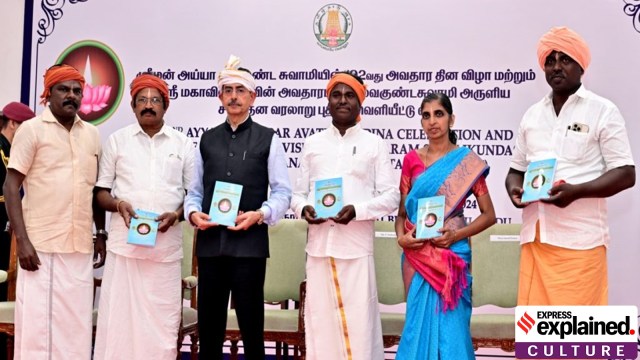Who was Ayya Vaikundar, and why TN Governor calling him ‘Sanatan Dharma saviour’ sparked a row
Ayya Vaikundar is revered as a social reformer and the founder of the Ayyavazhi sect. Through his teachings, he had waged a war against caste discrimination and social inequalities.
 Tamil Nadu Governor R N Ravi at the event on March 4, at Raj Bhavan in Chennai. (Photo: Raj Bhavan, Tamil Nadu)
Tamil Nadu Governor R N Ravi at the event on March 4, at Raj Bhavan in Chennai. (Photo: Raj Bhavan, Tamil Nadu)Tamil Nadu Governor R N Ravi’s recent remarks about the 19th-century social reformer Ayya Vaikundar — that he was Lord Vishnu incarnated to prevent the destruction of Sanatan Dharma — have evoked sharp reactions in the state, from politicians as well as Vaikundar’s followers.
The Governor made the statements on March 4, at an event to mark the 192nd Ayya Vaikundar Avathara Dina Vizha, or his birth anniversary.
Vaikundar, the social reformer
Ayya Vaikundar, born in 1809, is revered as a social reformer and the founder of the Ayyavazhi sect, primarily in southern Tamil Nadu. His teachings focused on equality, fraternity, and the eradication of caste-based discrimination, challenging the established religious and social hierarchies of the time. Thus, Governor Ravi’s portrayal of him as a protector of Sanatan Dharma, a term often associated with orthodox Hinduism in contexts of caste politics debates, has been vehemently opposed.
At a time when rigid casteism and caste-based atrocities were the norm, Vaikundar introduced measures to challenge these divisions. He organised Samapanthi-bhojana or community eateries for people from all backgrounds. He would send his disciples to the homes of lower castes to eat with them.
When lower castes were not allowed to fetch water from wells used by upper caste Hindus, Vaikundar initiated the digging of common wells, called Muthirikinarus.
At a time when priests threw vibhuti and sandal paste at devotees from a distance to avoid touching them — a practice that still exists — and lower castes were not allowed to enter temples at all, Vaikundar introduced Thottu Namam, in which he inspired priests to apply the sacred paste on devotees’ forehead, irrespective of their caste. The paste would be applied in the form of a lamp, indicating the soul and God, representing the form of God inside every life.
Vaikundar also encouraged all devotees to wear turbans and dhotis, promoting equality. He initiated the Thuvayal Panthy programme, teaching vegetarianism and discipline to followers, who spread these teachings across Tamil Nadu. He established Nizhal Thangals as community worship spaces, which did not have any idol or deity, and only Tamil was used for worship. These community worship centers also had community kitchens and even basic schools.
He pioneered education for the lower castes and opposed discriminatory taxes. One of his significant interventions was the introduction of simplified, inclusive marriage customs without a Brahmin priest or Sanskrit mantras.
The remarks, reactions
On March 3, Prime Minister Narendra Modi had paid tributes to Ayya Vaikundar on his birth anniversary. “On his birth anniversary, I bow to Sri Ayya Vaikunda Swamikal. We are all proud of his innumerable efforts to build a compassionate and harmonious society where the poorest of the poor are empowered. We reiterate our commitment to fulfilling his vision for humanity,” he wrote on X.
A day later, Ravi said Ayya Vaikundar was an incarnation of Lord Vishnu who appeared in the early 19th century to prevent the destruction of Sanatan Dharma and the evangelisation of the public by the British government. He said that Vaikundar’s text ‘Akilathirattu Ammanai’ is the essence of Sanatan Dharma, which is that everyone is equal and children of the same divine.
Ayyavazhi sect chief administrator, Bala Prajapathi Adigalar, was quick to condemn Ravi for his “non-factual” remarks. Speaking to reporters in Kanyakumari, Adigalar said “those who are ignorant of history should not pass comments”.
“Vaikundar’s fight was to eradicate ignorance in people. When he called those who divided people on the basis of caste as vile persons, how can [the Governor] call him a savior of Sanatan dharma?” he said.
Tamil Nadu Legislative Assembly speaker M Appavu also criticised the Governor’s remarks. Law Minister S Regupathy accused Ravi of “seeking publicity through his controversial remarks” and acting as the Opposition figure in the state “as both AIADMK and BJP are inactive.”
Historians, too, contested Ravi’s version. “Mainstream political parties engage in appropriation, and it may not always be a bad thing. However, appropriation without any logic or reason is called misappropriation, which is what Ravi has done to Vaikundar,” said a historian in Tamil Nadu on the condition of anonymity.
Another expert and history professor, requesting anonymity, said movements led by Vaikundar and similar figures in South India were fundamentally different from mainstream political or religious agendas of their times.
“You cannot appreciate the unique nature of social reform movements in Travancore and neighbouring regions without understanding the historical context of the struggles faced by the lower castes, particularly the Pulayars and Ezhavas. These movements, including those led by Vaikundar, Narayana Guru, and Ayyankali, emerged as counter-movements to the severe societal restrictions imposed by the upper castes and the ruling class of Travancore. While Vaikundar and Narayana Guru’s movements took a more conventional religious route and seemingly stood within the societal faith system, Ayyankali’s approach was more militant,” he said.
- 01
- 02
- 03
- 04
- 05






































